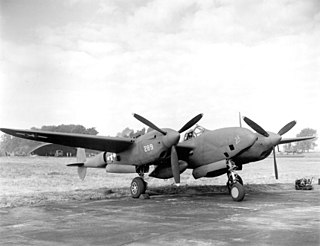
The 67th Cyberspace Operations Group is a unit of the 67th Cyberspace Wing. Headquartered on Kelly Field Annex's Security Hill, the group is an Air Force information operations unit.

15th Attack Squadron is a United States Air Force unit assigned to the 432d Wing, 732nd Operations Group at Creech Air Force Base near Indian Springs, Nevada. It flies the General Atomics MQ-9 Reaper remotely piloted aircraft.

The 17th Attack Squadron is a squadron of the United States Air Force. It is assigned to the 432d Wing, and stationed at Creech Air Force Base in Indian Springs, Nevada. The 17th is equipped with the MQ-9 Reaper.

The 20th Intelligence Squadron is a United States Air Force unit, assigned to the 363d Intelligence, Surveillance, and Reconnaissance Group at Offutt Air Force Base, Nebraska. It has served at Offutt since June 1992, when it was activated as the 20th Air Intelligence Squadron.

The 345th Bombardment Group is an inactive United States Air Force unit. Its last assignment was with the Tactical Air Command at Langley Air Force Base, Virginia, where it was inactivated on 25 June 1959.

The 69th Reconnaissance Group is an inactive United States Air Force that was part of Air Combat Command, the group was stationed at Grand Forks Air Force Base, North Dakota where it was a tenant of the 319th Air Base Wing.

The 6th Air Intelligence Squadron is an inactive unit of the United States Air Force. Its last assignment was with Seventh Air Force, stationed at Osan Air Base, Korea. It was inactivated in 1993. The unit was originally established at Army Air Base, Colorado Springs, Colorado as the 6th Photographic Group on 5 February 1943, under the command of Lt Waymond Davis. Later that year, the unit was redesignated the 6th Reconnaissance Group and deployed to the southwest Pacific as a component of the Fifth Air Force.

The 41st Electronic Combat Squadron is a United States Air Force unit. Its current assignment is with the 55th Electronic Combat Group at Davis–Monthan Air Force Base, Arizona as a geographically separated unit from its parent wing, the 55th Wing at Offutt Air Force Base, Nebraska. It operates the Lockheed EC-130H Compass Call communications-jamming aircraft.

The III Reconnaissance Command is a disbanded United States Army Air Forces unit. Its last assignment was with Third Air Force stationed at Rapid City Army Air Base, South Dakota, where it was inactivated on 8 April 1946. After transferring to the United States Air Force in September 1947, it was disbanded in October 1948.
The 74th Reconnaissance Group is an inactive United States Air Force unit. It was last assigned to the 91st Air Division at Stewart AFB, New York.
The II Air Support Command is an inactive United States Air Force unit. It was last assigned to Third Air Force at Biggs Field, Texas, as the II Tactical Air Division, where it was inactivated on 22 December 1945.

The I Tactical Air Division is an inactive United States Air Force unit. It was last assigned to Second Air Force, based at Biggs Field, Texas. It was inactivated on 22 December 1945.

The Second Bombardment Wing, abbreviated as 2nd Bombardment Wing of the United States Army Air Forces is a disbanded unit whose last assignment was with the Continental Air Forces, based at McChord Field, Washington. It was last active in November 1945.

The United States Air Force's 543d Intelligence, Surveillance and Reconnaissance Group is an intelligence unit located at Joint Base San Antonio, Texas. It has been located there since 1997, when it was activated as the 543d Intelligence Group. It focuses on cryptologic operations and signals intelligence.

The United States Air Force's 10th Intelligence Support Squadron is an intelligence unit located at Langley Air Force Base, Virginia.

The 3rd Special Operations Squadron is part of the 27th Special Operations Group of the Air Force Special Operations Command at Cannon Air Force Base, New Mexico. It flies MQ-9 Reaper unmanned combat aerial vehicles or "drones"; the 3rd SOS is the first Remotely Piloted Aircraft (RPA) squadron within the AFSOC.

The 29th Attack Squadron is a remotely piloted vehicle training unit of the United States Air Force. Assigned to the 49th Operations Group, 49th Wing at Holloman Air Force Base, New Mexico. Flying the General Atomics MQ-9 Reaper. It was activated on 23 October 2009.

The 5th Photographic Reconnaissance Squadron is an inactive United States Air Force unit. It was last assigned to the 3d Reconnaissance Group. It was inactivated at Pomigliano Airfield, Italy on 12 September 1945.

The 24th Intelligence Squadron is an active United States Air Force unit stationed at Ramstein Air Base, Germany. The squadron was first activated as the 24th Observation Squadron during World War II. it conducted aerial reconnaissance training, until converting to the photographic mission as the 33d Photographic Reconnaissance Squadron. it deployed to the European Theater of Operations, where it conducted combat reconnaissance missions, earning a Distinguished Unit Citation and being cited in the Belgian Army Order of the Day on two occasions. It remained in Europe following V-E Day, becoming non operational in August 1945. Its ground echelon returned to the United States in the fall of 1945 and it was inactivated at the port of embarkation.

The 27th Intelligence Squadron is an active squadron of the United States Air Force, stationed at Langley Air Force Base, part of Joint Base Langley-Eustis, near Hampton, Virginia. It is assigned to the 480th Intelligence, Surveillance and Reconnaissance Wing.






















